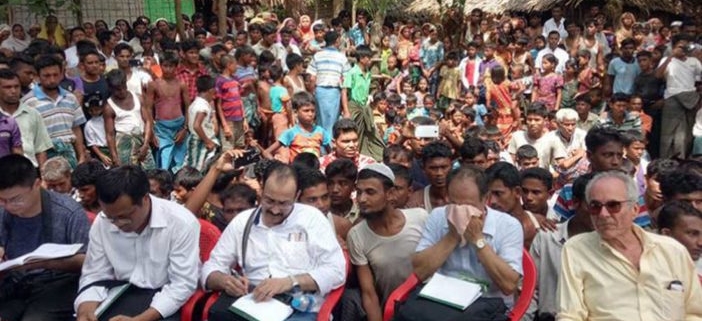Diplomats, UN Witness Northern Rakhine Devastation
By MOE MYINT 2 October 2017
MAUNGDAW, Rakhine State— Twenty diplomats who visited conflict-torn areas of northern Rakhine on a government-sponsored tour on Monday called on Myanmar authorities to fully investigate allegations of human rights violations, allow unimpeded humanitarian access and urged the government to allow the UN fact-finding mission to visit.
Diplomats and UN officials visited conflict-torn areas of northern Rakhine for the first time since more than 500,000 self-identifying Rohingya Muslims, hundreds of ethnic Rakhine and others fled the area since Aug 25.
The tour on Monday was joined by 66 people from foreign embassies, European Union organizations, UN agencies, the cabinet and local news outlets, including from The Irrawaddy.
They were divided into three groups and flown to Maungdaw and Rathedaung townships to meet with local people—Rakhine, Muslims, Mro and Hindu—from six villages in the areas.
The collective statement by embassies including the US, UK, Australia, Indonesia, Turkey, and Germany, released after the trip on Monday afternoon said as friends of Myanmar they remained ready to work with the Myanmar government to help Rakhine reach its potential and supported the full implementation of the recommendations made by the Advisory Commission on Rakhine State.
Myanmar government has refused entry to members of UN fact-finding mission to investigate previous allegations of killings, rape and torture by security forces against self-identifying Rohingya Muslims during operations late last year.
The foreign embassies encouraged the government to enable the “voluntary, dignified and safe” return of more than a half a million refugees in Bangladesh to their places of origin.
“We call once more for unimpeded humanitarian access to northern Rakhine and resumption of life-saving services without discrimination throughout the state,” it added.
The Turkish Ambassador to Myanmar Kerem Divanlioglu welcomed the Myanmar government’s invitation to diplomats and journalists inspect the scene on the ground and said that Muslim, Hindu, and Arakanese Buddhist communities were all deeply affected by the conflict.
The Turkish government will continue to provide humanitarian assistance in the region, he said.
Switzerland’s Ambassador to Myanmar Paul Seger said the situation was different to what he had expected as whole villages had been burnt down. He described the situation as a “human tragedy” and that he had spoken to some Hindu, Muslim, and Arakanese who had wanted to live together peacefully.
The trip was arranged after Myanmar State Counselor Daw Aung San Suu Kyi’s diplomatic briefing last month on the Rakhine State situation in which she said despite a large number of people fleeing the area, there were people who stayed behind.
“We can arrange for you to visit these areas, and to ask [remaining villagers]for yourself, why they have not fled, why they have chosen to remain in their villages, even at a time when everything around them seems to be in a state of turmoil,” she said on Sept. 19.
The UN said “it looks forward to strengthening trust and cooperation with all communities and Myanmar government” in a statement released after the trip on Monday afternoon.
Three UN representatives—the UN Resident Coordinator, a WFP representative and a senior UN High Commission for Refugees official—joined the trip.
The statement said the UN stands ready to provide its full support to the authorities in responding to the humanitarian and human rights crisis in northern Rakhine as well as the implementation of the recommendations of the Advisory Commission on Rakhine State.
Border affairs minister Lt-Gen said: “We have carried out what the diplomats requested of us and we have not hidden anything or set anything up. The State Counselor instructed me to show places in the community regardless of race or religion.”
The Union government is working on a “roadmap” on Rakhine State after meeting with all concerned agencies and government ministries.



